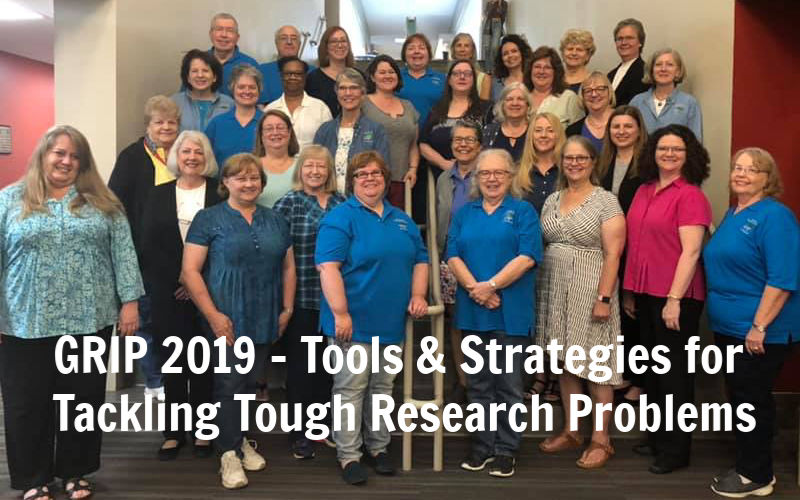“Been there, done that,” does NOT apply when it comes to attending a week-long genealogy institute. My fifth session at the Genealogical Research Institute of Pittsburgh (GRIP) was yet another outstanding week of hands-on learning and research.

I loved being a GRIP student again after teaching “Family Archiving” for the 2016 and 2018 sessions. The collegial atmosphere throughout the week makes it easy to understand GRIP’s nickname, “Genealogy Summer Camp.” Here are my top five take-aways from the week as a student:
1. Learn from top-notch instructors
Course coordinators and instructors come from throughout the country to share their expertise. A typical class may include three to six different presenters, each giving different perspectives to build the course content. I attended “Tools and Strategies for Tackling Tough Research Problems” with Kimberly Powell, Course Coordinator, and instructors Karen Mauer Jones, CG, FGBS, FUGA; Angela Packer McGhie, CG; and Karen Stanbary, CG. The team worked together to present a variety of lectures, discussions, and practical hands-on exercises that propelled my tough problems out of the bog where they’ve been stuck for far too long. I am already making progress with the lessons learned throughout the week.
2. Experience informal learning opportunities
Do you have a question about records in a certain Pennsylvania county, or a military history conundrum? There’s a very good chance someone in your course can help, or introduce you to someone who knows the answer. Thanks to a lunch-time conversation I now have a few more places to look for my mobile Mifflin County ancestors.
3. Genealogy 24/7
You can work on your genealogy all day and all night, if you want to. I found that a regular 9 to 9 routine worked pretty well too, and left some time for eating and sleeping. The evening lectures are always interesting and worthwhile. And, it’s a fun way to relax and learn more with your genealogy friends.
4. Meet new and old genealogy friends
Group meet-ups are part of the program at GRIP with photos and meals typically scheduled for ProGen, DAR, and other groups. I was surprised to meet a Southern California DAR member face-to-face. We have been working together online for months, but had to go to Pennsylvania to meet, it seems. Genealogy Summer Camp is the place to talk about dead people, small segments, and archaic handwriting. No eye-rolls. No sighs. The private GRIP Facebook Group showed more than a few new-found friendships. Dorm living and cafeteria dining offer an easy and friendly atmosphere for casual conversation.
5. Be inspired and recharged
Genealogy can be lonely. Many days, I spend more time with Mac than a living breathing human. Attending a genealogy institute brings fresh ideas and energy to my work. I pulled out old research problems that have been sidelined while I blogged and moved houses. It’s exciting to discover new ways to look at the information and to feel empowered to work through to a conclusion. Now that I’m home again, I’ve pulled out my notes and continue to learn from my GRIP instructors and fellow students.
Why Attend an Institute? Why GRIP?
Five days of intensive genealogy education has been a highlight of my summer. I look forward to being on the other side of the room next year when I am the course coordinator for “Family Archiving: Heirlooms in the Digital Age.” Teaching genealogy and connecting with students is another way to learn even more. And, I’m excited to see that with three sessions on offer, I may be able to attend a class again as well.
Directors Deborah Lichtner Deal and Elissa Scalise Powell work with course coordinators to offer a variety of classes for all skill and interest levels. It will be tough to decide what classes to take with twenty excellent courses to choose from in 2020. Mark your calendar and make plans now to attend GRIP 2020 next summer.





